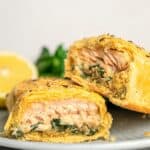This post may contain affiliate links. Read my disclosure policy.
This Gluten Free Salmon Wellington is savory and juicy, made with flaky salmon filet and cheesy spinach filling baked inside a light and golden puff pastry crust. Salmon en croute is the perfect meal for entertaining, as it looks extra fancy but comes together in under an hour!
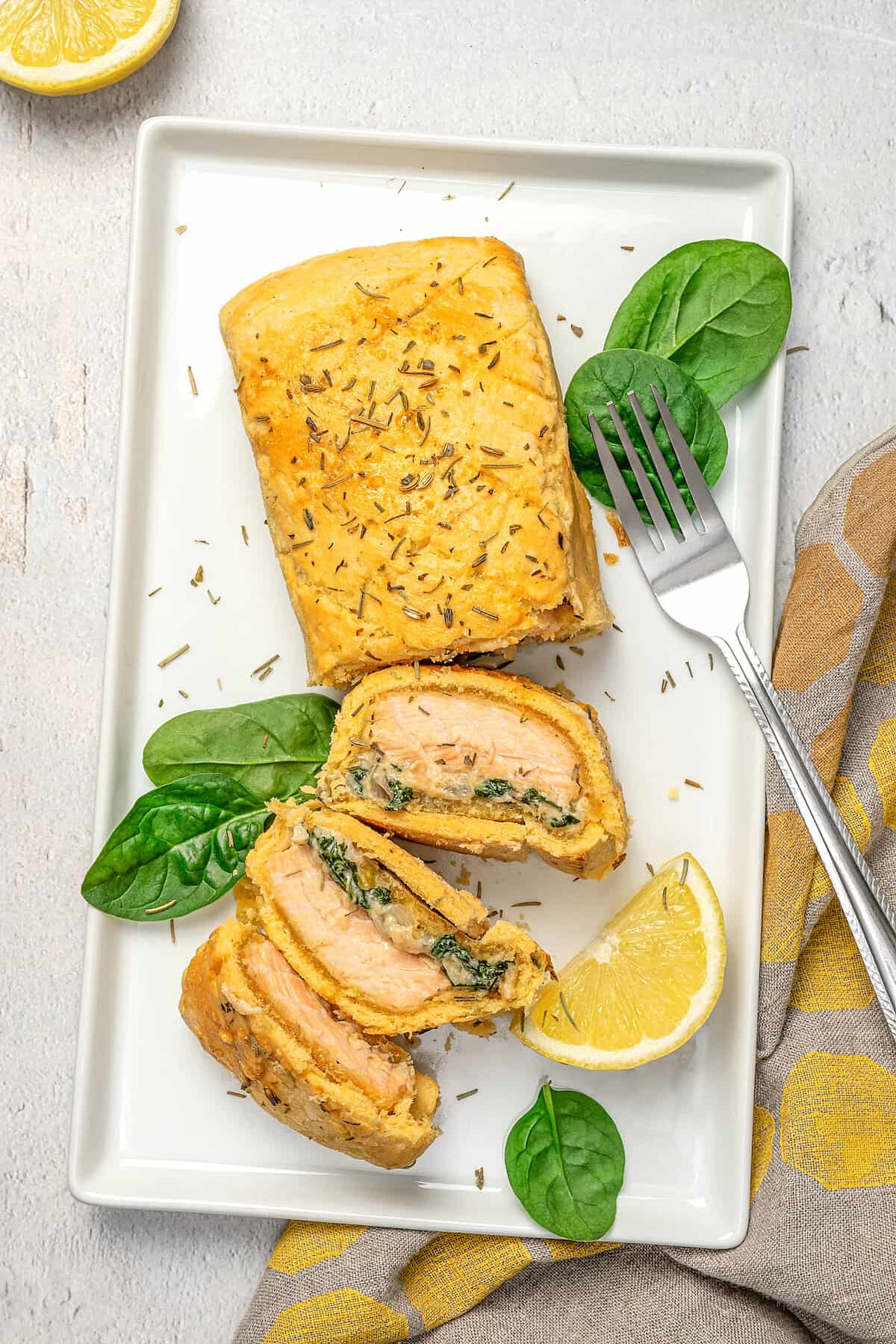
Easy Salmon Wellington with Gluten-Free Puff Pastry
As a cook and as a mom, I love to feed people. Of course, entertaining is part of the territory. And with the festive season peaking its jolly red nose around the corner, I’m SO excited to share this gorgeous baked Salmon Wellington.
This is a delicious gluten-free dinner recipe, full of flavor and deceptively simple to make. Prepared with juicy, flaky salmon that’s smothered in a cheesy spinach coating, then oven-baked inside my favorite brand of buttery gluten-free puff pastry.
Definitely filing this Salmon Wellington recipe under “last-minute entertaining ideas”! Whether I’m hosting friends or the inlaws, or if I need a pescetarian meal for the holidays, this gluten-free salmon Wellington is the answer.
Why Is It Called a Wellington?
You may have already heard of Beef Wellington. A Beef Wellington involves beef tenderloin coated in pâté and duxelles (finely chopped mushrooms), wrapped in puff pastry. But what’s in the name? A bit of Googling led to some fun food history.
It turns out, a Wellington dates back as far as the 1800s Britain and is named after the First Duke of, you guessed it, Wellington. The Duke would later go on to be Prime Minister!
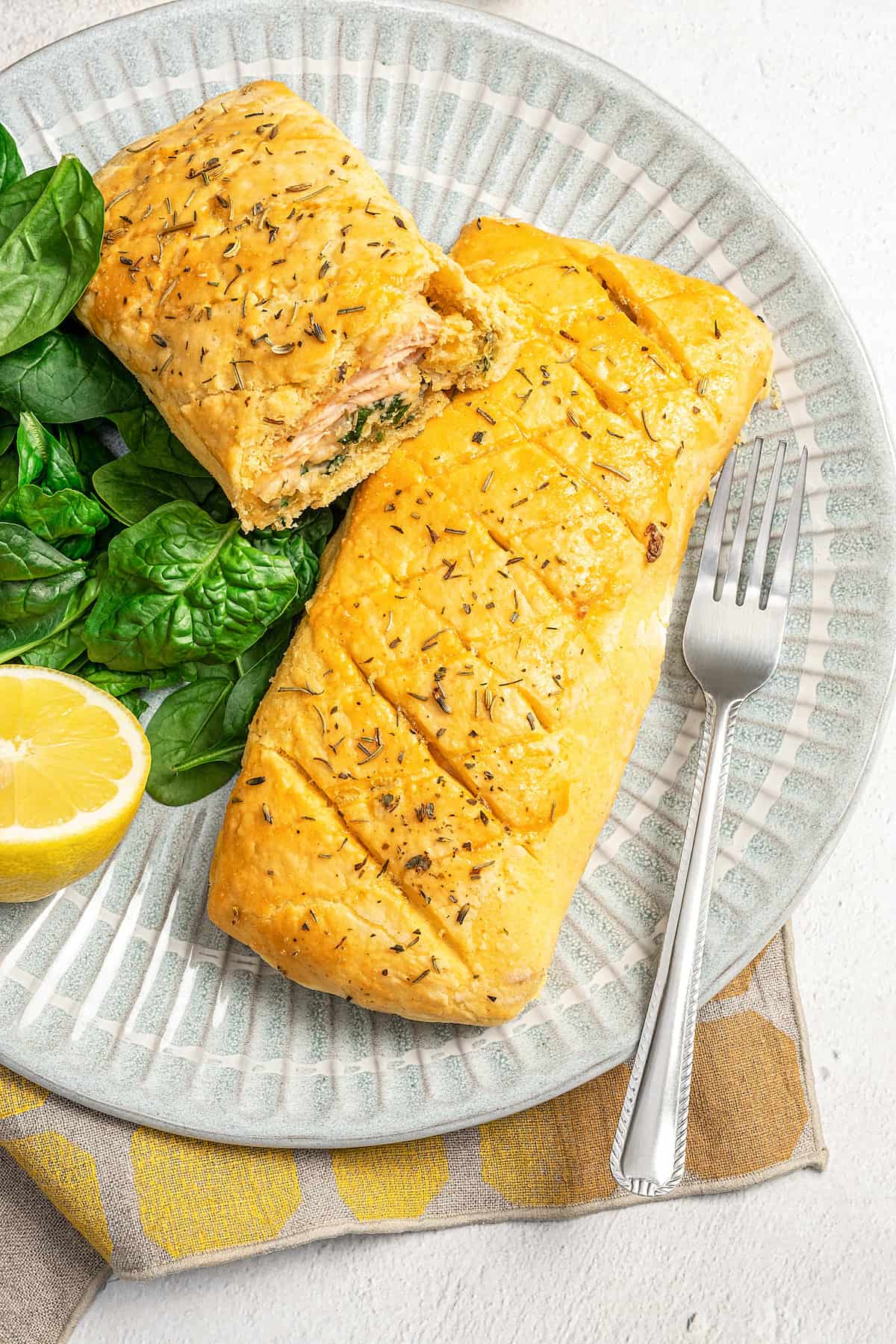
The Ingredients
While the below list may look a little on the long side, I promise, Salmon Wellington uses surprisingly basic ingredients! Get your hands on some good quality salmon, and the rest is super straightforward. Be sure to check the full details in the recipe card later on, but here’s an overview:
- Salmon Fillets: I love making this recipe with fresh salmon fillets. Don’t forget to remove the skin beforehand.
- Dijon Mustard: Dijon gives the salmon a bit more flavor and a hint of heat. If you don’t have Dijon mustard, use regular mustard mixed with a bit of mayonnaise.
- Olive Oil: A nice quality extra virgin olive oil is always worth the investment!
- Garlic and Shallot: Mince up some fresh cloves of garlic and shallot for the aromatics. Shallot has a mild, sweeter flavor than regular onion. If you can’t find shallots where you are, a mild white onion, like Vidalia, will also work.
- White Wine: Choose a dry white wine, like a Sauvignon Blanc or Chardonnay.
- Cream Cheese: I recommend using blocks of cream cheese and not the kind that comes in tubs. Let the cream cheese come to room temperature so it’s easier to combine.
- Baby Spinach: Fresh baby spinach is perfect as it softens up quickly.
- Gluten-Free Panko: Or regular panko breadcrumbs if you’re not making this recipe gluten-free. Use the plain kind and not the seasoned breadcrumbs.
- Parmesan Cheese: Parmesan or pecorino, freshly grated.
- Gluten-Free Puff Pastry: For this recipe, I had great results with Geefree gluten-free puff pastry dough. You can use your preferred brand of frozen puff pastry, simply thaw it following the package directions. You’ll also need a bit of gluten-free flour for flouring your work surface.
- Egg: To make an egg wash. This gets the outside of the baked Wellington beautifully glossy and golden.
- Herbes de Provence: An herb blend that’s super popular in French cooking. You’ll it find in many grocery stores. Herbes de Provence consists of dried herbs like thyme, rosemary, basil, oregano, marjoram, bay leaf, and others depending on the blend.
- Salt and Pepper
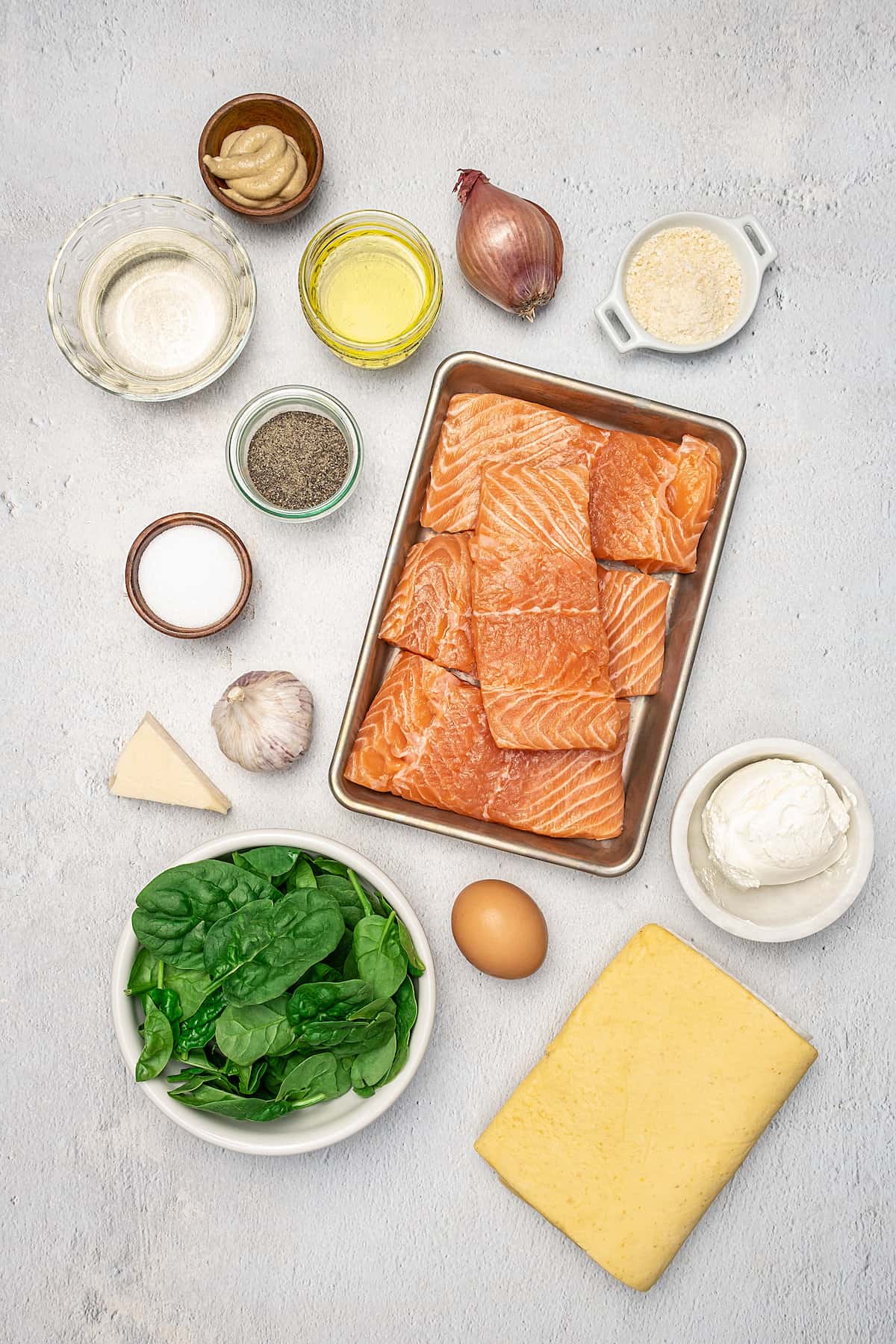
Can I Use Frozen Salmon?
Yes, you can make this Salmon Wellington with frozen salmon fillets. Be sure to take the fish out of the freezer the night before and place it in the fridge, so it has enough time to thaw completely before you wrap it in the pastry crust. Otherwise, you’ll wind up with a soggy Wellington!
How to Make Salmon Wellington
Salmon Wellington is one of those lazy dinners that still comes out of the oven looking and smelling amazing. Here’s how easy it is to make:
Prepare the Salmon: First, rub the salmon filets with Dijon mustard, season with salt and pepper, and set them aside on a baking sheet.
Sauté: Sauté the shallot and garlic in a skillet with olive oil until softened and fragrant. Pour in the white wine, then cook it off over high heat for a few minutes before stirring in the cream cheese.
Prepare the Spinach Filling: Next, you’ll add the spinach leaves, panko crumbs, and shredded parmesan. Continue to cook until the spinach is wilted. Remove the cheesy spinach filling from the heat and set it aside.
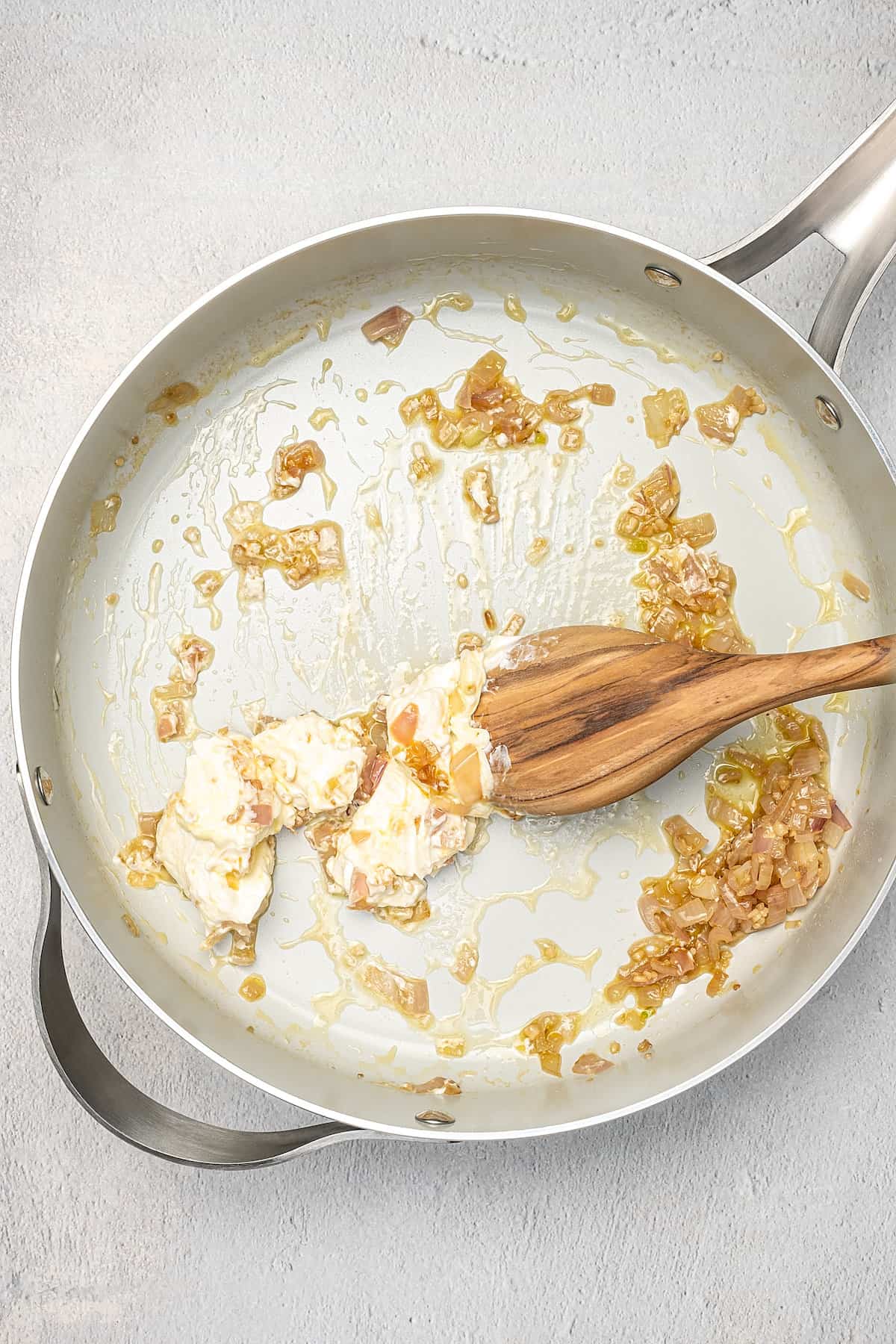
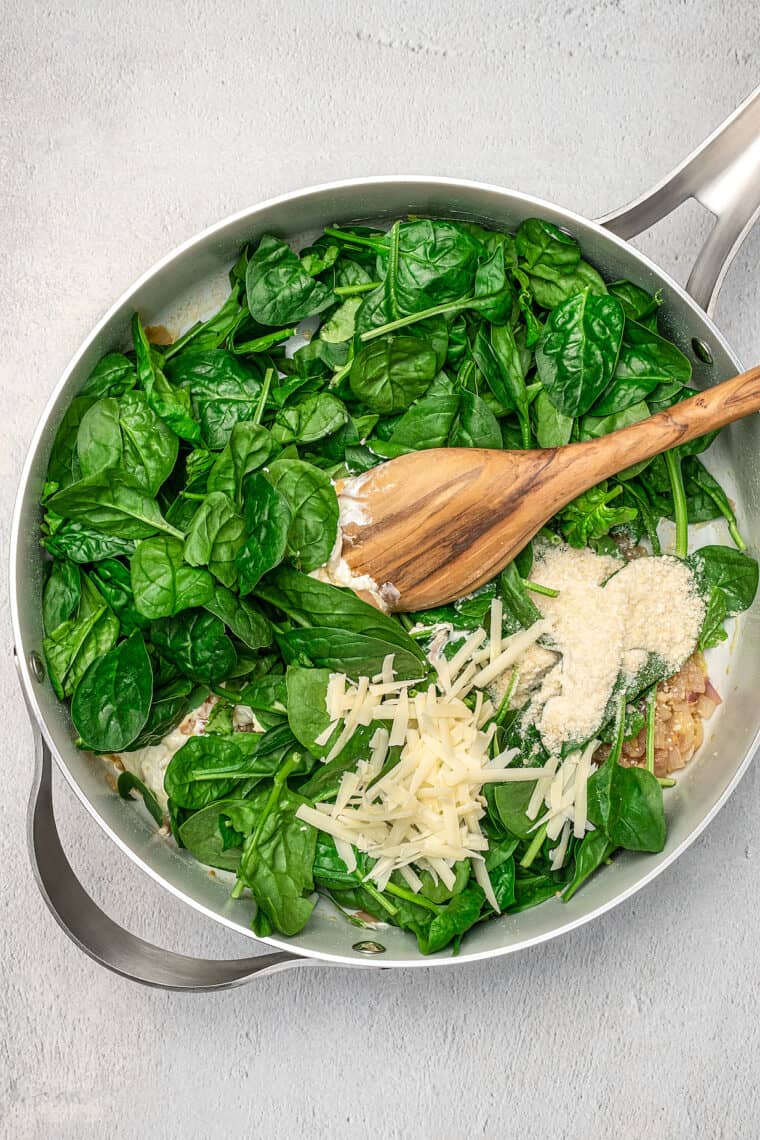
Roll out the Pastry: Next, dust your countertop with flour, and take out your first package of gluten-free puff pastry. Unfold and divide this first puff pastry in two. Setting aside the second half, roll out the first pastry sheet. When you place your salmon fillet in the middle of the pastry, there should be about 2 inches of dough on each side.
Wrap the Salmon: Position your first salmon fillet in the center of the rolled-out pastry dough. Now, spread ¼ of the spinach filling over the salmon, then brush the edges of the dough with egg wash. Beginning with the longer sides, fold the edges of the dough over the fillet, then fold up the shorter ends. Finally, flip the Wellington over onto a parchment-lined baking sheet. Repeat with the rest of your fillets and pastry sheets.
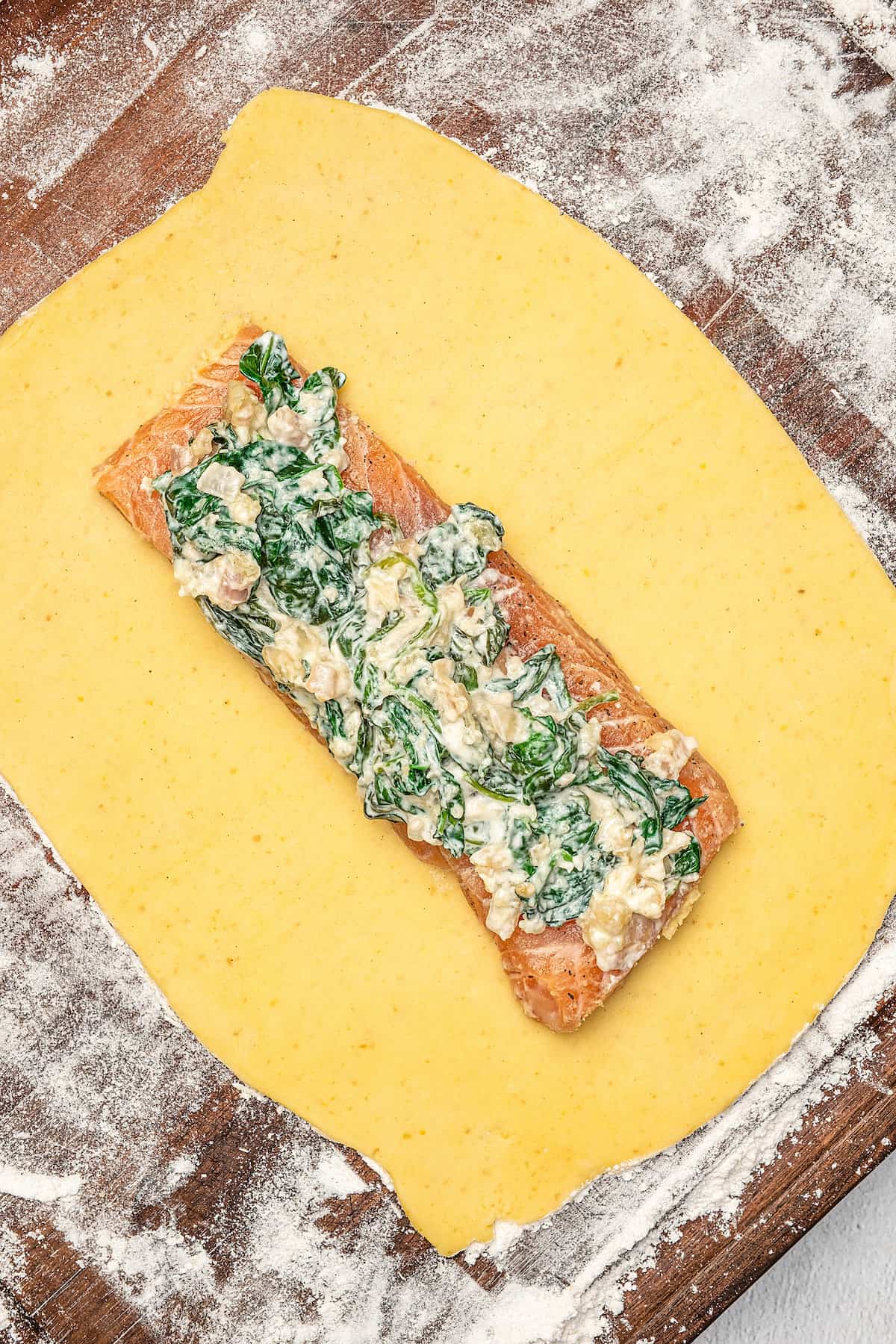
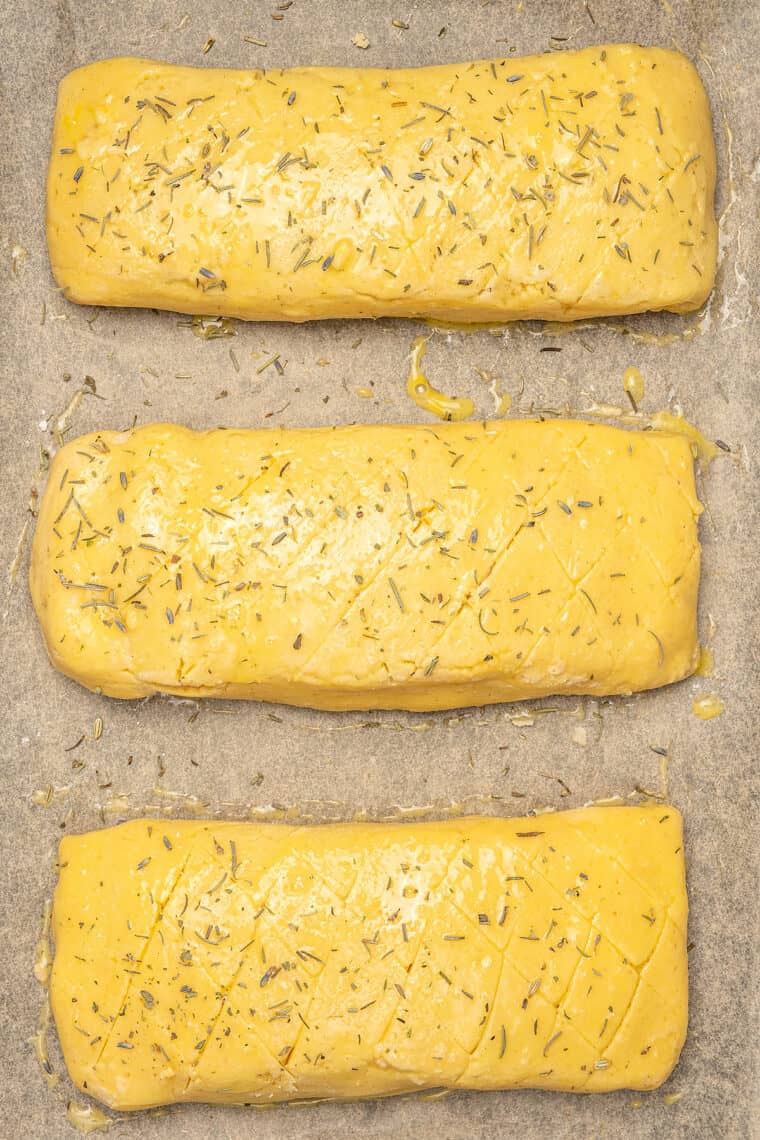
Bake: Once wrapped, give your salmon Wellingtons a brush with egg wash and diagonally score the tops of the pastry. Sprinkle on some Herbes de Provence. Lastly, pop the Wellingtons into a 375ºF oven for about half an hour, until the pastry tops are golden.
Take your wrapped salmon out of the oven, slice, and serve! See below for easy ways to turn this salmon Wellington into a meal.
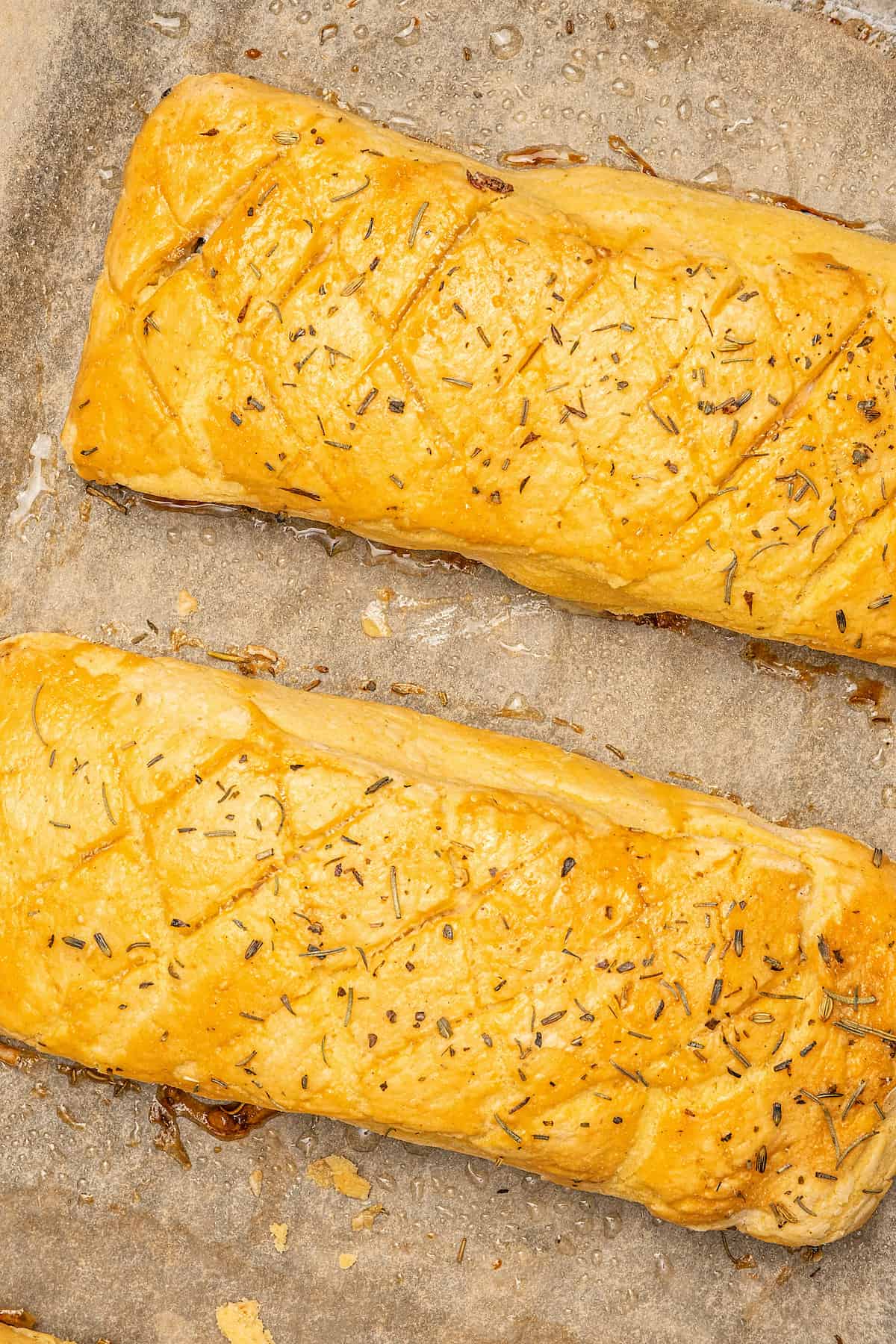
Tips for Success
Some extra tips for the perfect Salmon Wellington:
- The Easiest Way To Remove Salmon Skin: Use a sharp filet knife or similar when trimming the skin away from the salmon. Angle the knife downward, and hold one edge of the skin while you gently saw the knife lengthwise down the skillet, carefully separating the skin from the flesh.
- Use Room Temperature Dough: I had the best results working with the GeeFree puff pastry when it was at room temperature, and it wasn’t too sticky. This may not be the case for all gluten-free puff pastry brands, so use your discretion.
- Don’t Forget to Score the Puff Pastry: Scoring the tops of the Salmon Wellington in a crosshatch pattern is important, as this allows the steam to escape as it bakes. If the steam builds up inside the pastry, it can cause the Wellingtons to become soggy.
- Prevent the Pastry Bottoms From Getting Soggy: To follow the above note, if you’re concerned about the bottom of the puff pastry becoming soggy while it bakes, you can lightly dust the lined baking sheet with cornmeal first.
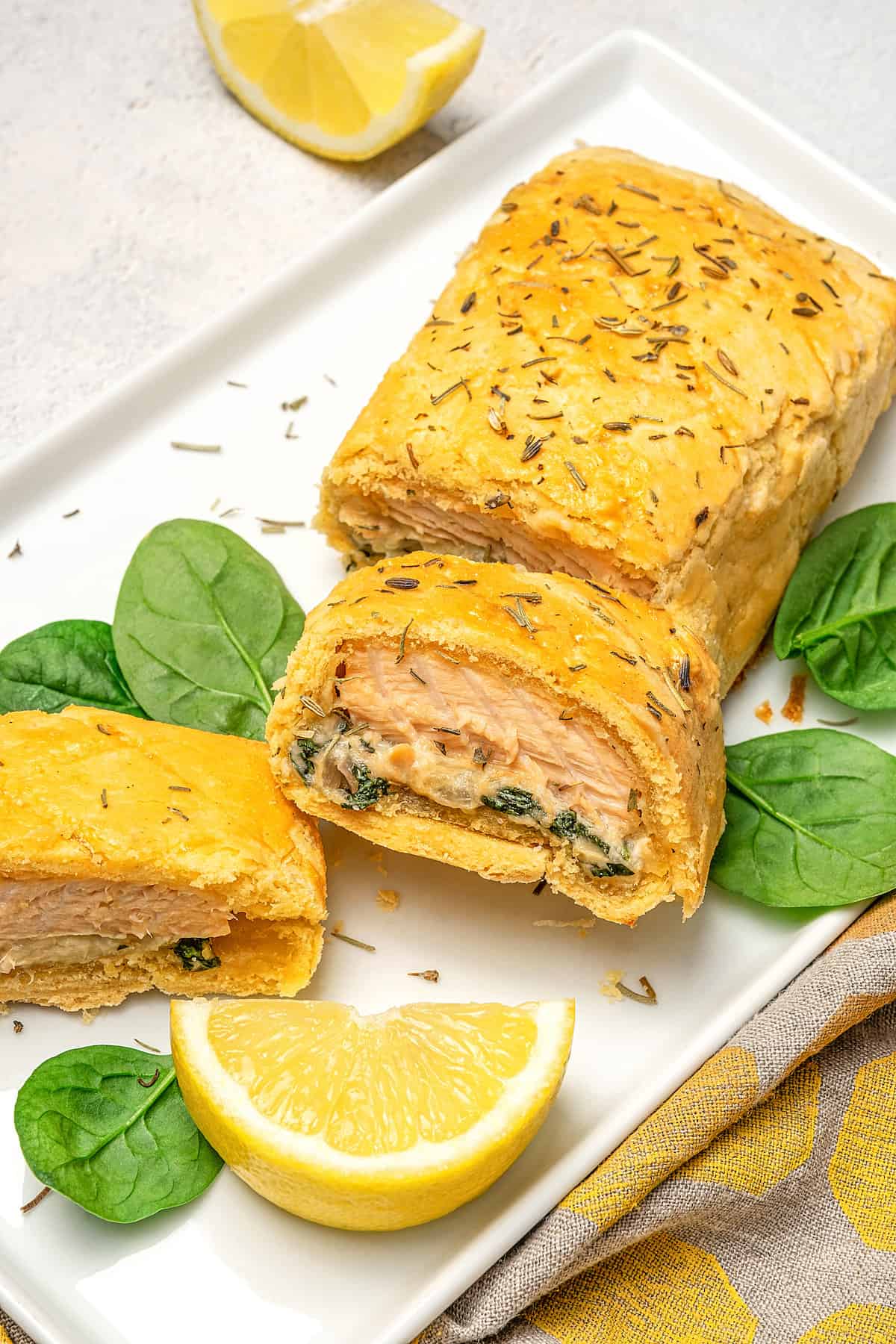
Common Questions
What is the difference between en croute and Wellington?
In this case, it’s the same thing! “Salmon en croute” is just another name for Salmon Wellington, and means “in a crust” in French.
How do you know when the salmon is done?
Salmon is done when the flesh flakes apart if you gently press on it. This is tricky to do with a Wellington since the salmon is wrapped up like a fancy burrito. To be sure that your salmon is cooked before you slice into it, your best bet is to use a thermometer. Salmon is done when the internal temp reads 125ºF to 130ºF.
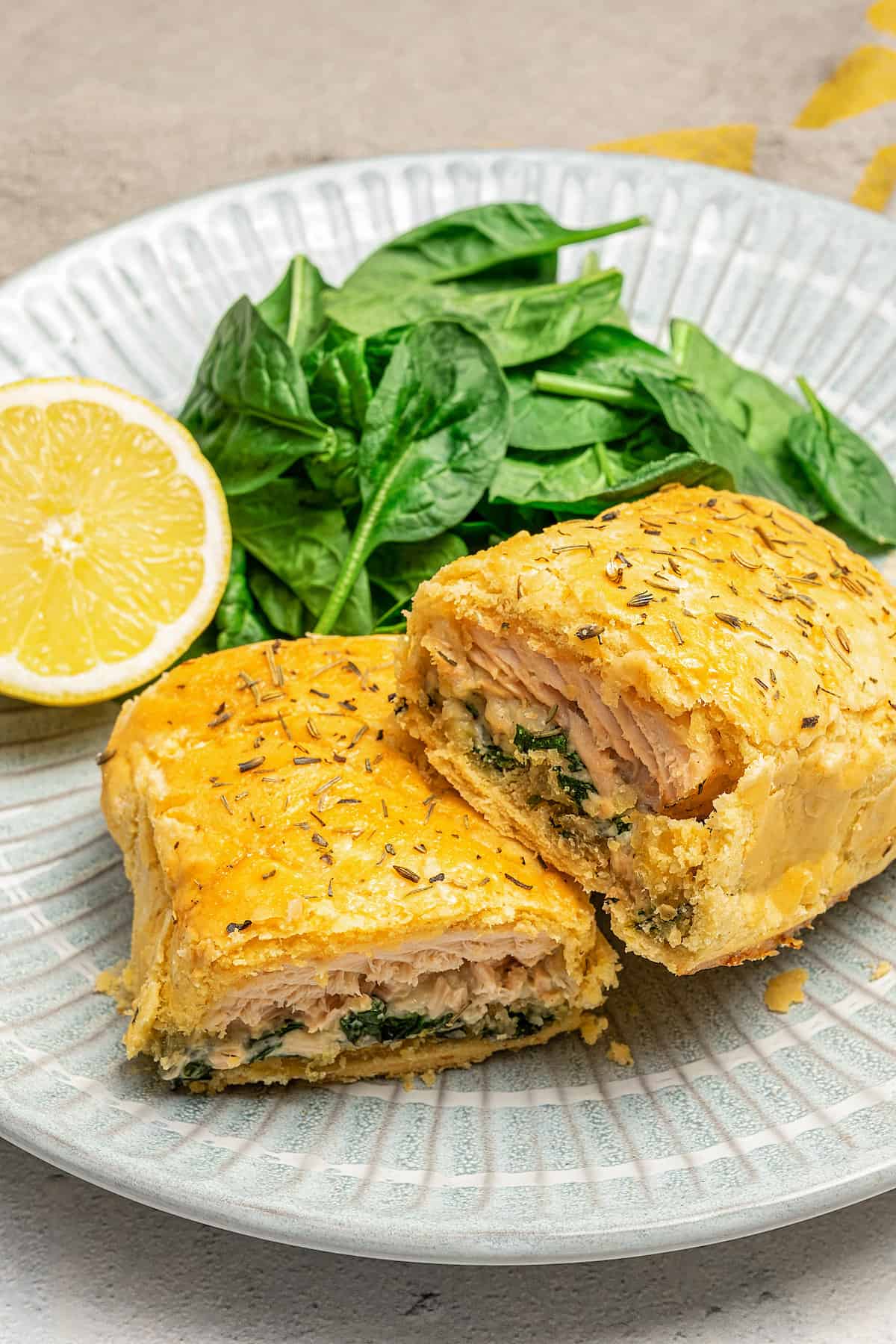
Make It a Meal
This gluten-free Salmon Wellington is impressive enough to serve for a holiday dinner and easy enough to make on any given night of the week! Here are some easy side dishes to make this salmon recipe into a meal:
- Veggies: Pair salmon en croute with Oven-Roasted Asparagus or Lemon Parmesan Roasted Broccoli. Or, serve it with a side of classic Ratatouille.
- Bread: You can’t go wrong with Gluten-Free Garlic Breadsticks or Gluten-Free Dinner Rolls.
- Potatoes: Salmon pairs great with Hasselback Sweet Potatoes or Herb Oven Fries.
- Salad: Serve with (more) fresh green spinach or an Italian Country Salad with Poached Pears.
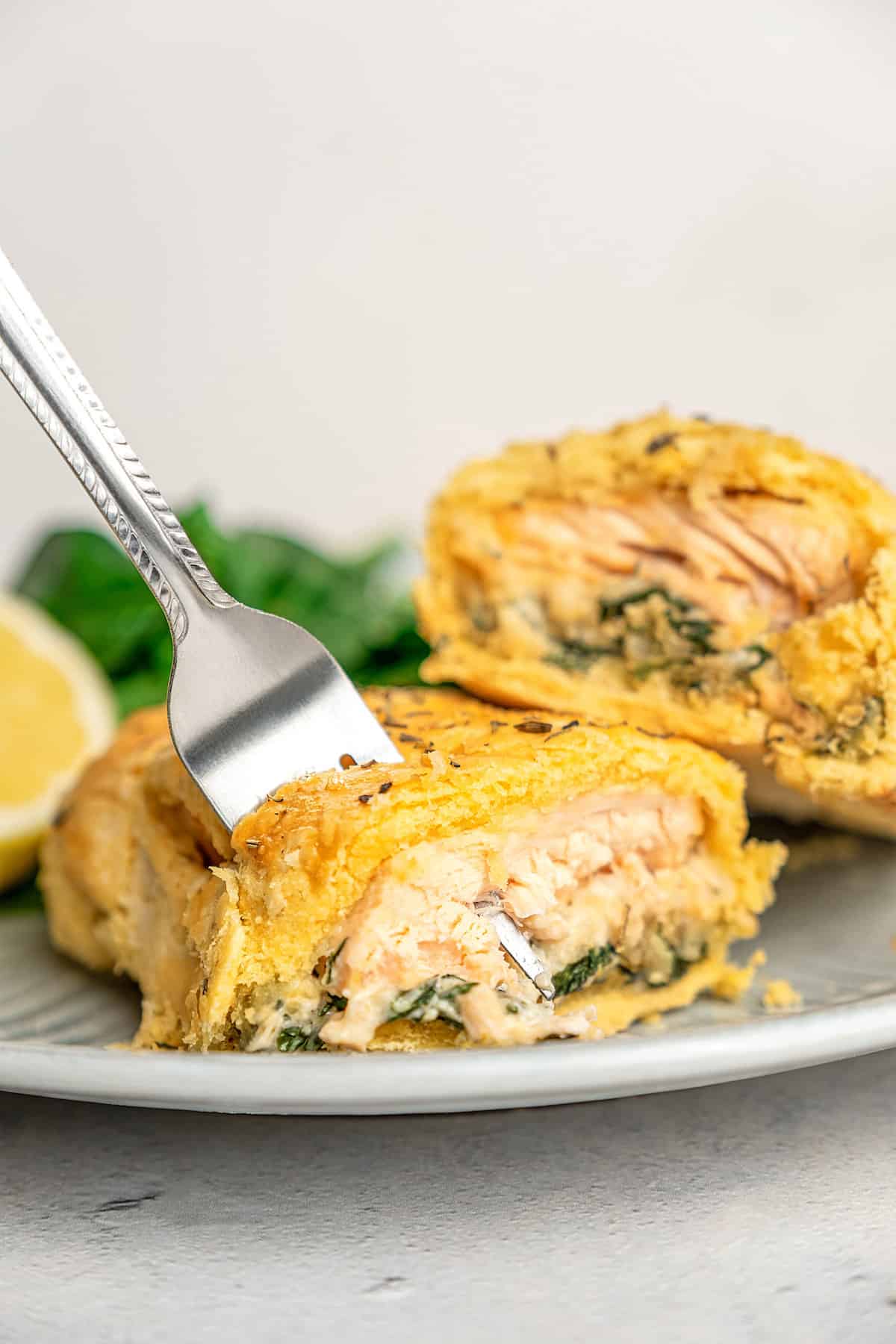
Storing and Reheating Leftovers
This Salmon Wellington is best the day it’s made, as that’s when the salmon and the puff pastry will taste the freshest. However, if you need to store leftover salmon en croute, keep it in an airtight container or tightly wrapped in the fridge. It can be stored for up to 2 days.
Reheat leftover Salmon Wellington in the oven at 375ºF for about 15 minutes, until the salmon is warmed through and the crust is crisped up again.
Can I Freeze Salmon En Croute?
This salmon recipe is best to freeze before it’s baked. If you’d like to freeze your Salmon Wellington, assemble it as directed, right up until the egg wash. Then, wrap it in plastic wrap or store the Wellington airtight instead, and place them in the freezer.
Salmon Wellington can be kept frozen for up to 1 month. Defrost completely in the fridge before baking.
Shop for Gluten Free Ingredients
Here are a few of the items you’ll need for this Salmon Wellington recipe. You should be able to find things like gluten free flour and panko, as well as the herbes de Provence, in the regular grocery store. But just in case it’s not available near you, these items can also be ordered online. The puff pastry is frozen, so you’ll have to pick that up locally.
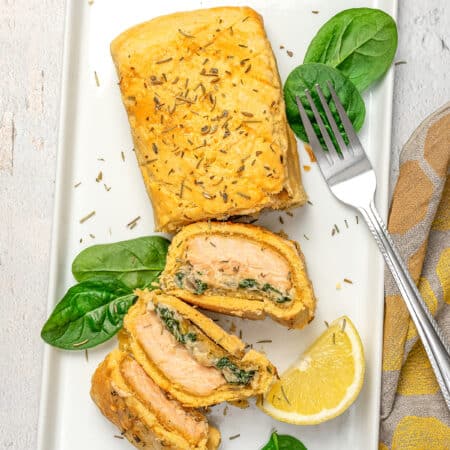
Gluten Free Salmon Wellington
Ingredients
- 4 7-8 oz salmon fillets , skin removed
- 2 tsp Dijon mustard
- salt and pepper to taste
- 2 tbsp olive oil
- 2 garlic cloves , minced
- 1 shallot , chopped
- 1/4 cup dry white wine
- 3 oz cream cheese , at room temperature
- 5 oz baby spinach , fresh
- 2 tbsp gluten free panko
- 1/4 cup shredded parmesan cheese
- 2 18 oz packages of gluten free puff pastry , I used Geefree Gluten Free puff pastry dough. Follow thawing instruction.
- Gluten free flour for rolling out the puffed pastry
- 1 egg , whisked for egg wash
- 2 tsp herbes de Provence
Instructions
- Place salmon fillets on a large plate or baking sheet. Rub both sides with dijon mustard and season with salt and pepper. Set aside.
- In a large pan over medium heat, add olive oil. Once the oil is hot, add the garlic and chopped shallot. Sauté until the shallots become soft and translucent.
- Add the wine and change the heat to high. Cook for about 5 minutes or until the liquid cooks out. Add the cream cheese and stir until the cream cheese is almost melted.
- Add the spinach, panko, and parmesan cheese. Sauté until the spinach has wilted. Remove from heat.
- Unfold the first puff pastry onto a lightly floured surface and divide it into two. If using the Geefree puffed pastry, it is easy to divide the sheet into two at the fold. Set aside the second pastry dough. Roll out the puff pastry dough so that you have about 2 inches on each side of your salmon. The size may vary depending on the size and shape of your salmon.
- Place a seasoned salmon fillet in the middle of your rolled-out puff pastry sheet.
- Divide the spinach mixture into 4 equal parts and evenly spread it onto the top of your salmon fillet. Brush the edges of the puff pastry with the egg wash.
- Fold the edges of the puff pastry over the salmon and spinach, starting with the long sides and then the shorter ends. Trim any excess pastry from the ends, then fold the ends on top. Flip the puff pastry-wrapped salmon over and transfer to a baking sheet lined with parchment paper.
- Repeat this process with the remaining puff pastry (and the second package).
- Brush the beaten egg on the top and sides of the pastry. Score the top of the pastry with a sharp knife, cutting shallow diagonal lines to create a crosshatch pattern. Sprinkle the top of your pastry with herbes de Provence.
- Bake at 375° for 30-35 minutes, until the pastry is golden brown.
- Slice and serve.
Notes
- Store-bought gluten-free puff pastry does not puff up the same as you may be used to. In order to achieve the thicker crust, I used two packages of the Geefree Puffed Pastry. This gives the Salmon Wellington a thick flaky crust.
- The texture of the Geefree puffed pastry is more buttery and crumbly than normal puffed pasty.
- Work with the Geefree puffed pastry at room temperature.


